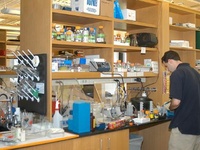He said he hoped that the scientific community would soon reach a “point where we have no restrictions on who can participate in research.”
He discussed legal precedents for a new research classification—“sensitive”—that has emerged in the post-Sept. 11 climate. He said he thinks that this new, ambiguously defined category will stymie the free exchange of ideas intrinsic to ordinary research.
Seen as a whole, Vest contended, the new legislation encompasses far more than visa concerns and flawed registration systems.
A host of restrictions on research—and new requirements about reporting information to the government—threaten to interject governmental influence into the fundamental components of academic inquiry, Vest has said repeatedly in public appearances since last year.
“Some people might say I’m being too alarmist on these matters, but I don’t think so,” Vest said. “I care about these things not just because of hoping for the interests of colleges and universities, but because I think it is a general interest for our country.”
John C. Crowley, MIT’s vice president for federal relations, says Vest leads a tight cadre of colleagues pursuing these issues.
“This is an issue of highest concern for the university’s central administration from the president right on down,” he says. “This is a core issue for Chuck, and it really is rooted in his commitment to continuing education in research and development.”
Research concerns have also mobilized some members of Harvard’s administration. The University’s top science adviser leveled similar criticism at the research restrictions mandated by the Patriot Act and other post-Sept. 11 legislation.
“Some of the restrictions are fairly onerous,” said Kathleen M. Buckley, Harvard’s assistant provost for science policy, last month. “They are in conflict with what we define to be our basic academic values.”
But while MIT’s Vest has purposefully and personally taken the role of public vanguard of these issues, Summers has been slow to take a stand—and students and faculty alike have demanded a firmer stance and more action than he has offered on his own.
In April, at the same meeting when Summers made his statement, an anonymous pair of non-citizen junior professors took Summers to task in a prepared statement, read by Professor of Classics Richard F. Thomas.
“We believe that the President and administration of Harvard University can and ought to do more than they have already done to promote and protect the responsible exercise of the right of free expression by all members of our academic community,” read the statement, entitled “The Chill at Harvard.”
The pair of anonymous professors weren’t alone in publicly criticizing Summers’ response to federal restrictions on academic freedom.
Ahmed T. el-Gaili ’98, a law student graduating this June, had to take his first semester of classes this year in London when he did not receive his visa renewal in time. The HIO and several members of the Faculty were helpful in working to help him clear a logistical path back to Cambridge, he says.
But in an e-mail to The Crimson last fall, el-Gaili expressed his hope that Summers would have done more to help students in his position.
Read more in News
Pataki: 'Yale is Going to Crush Harvard'













